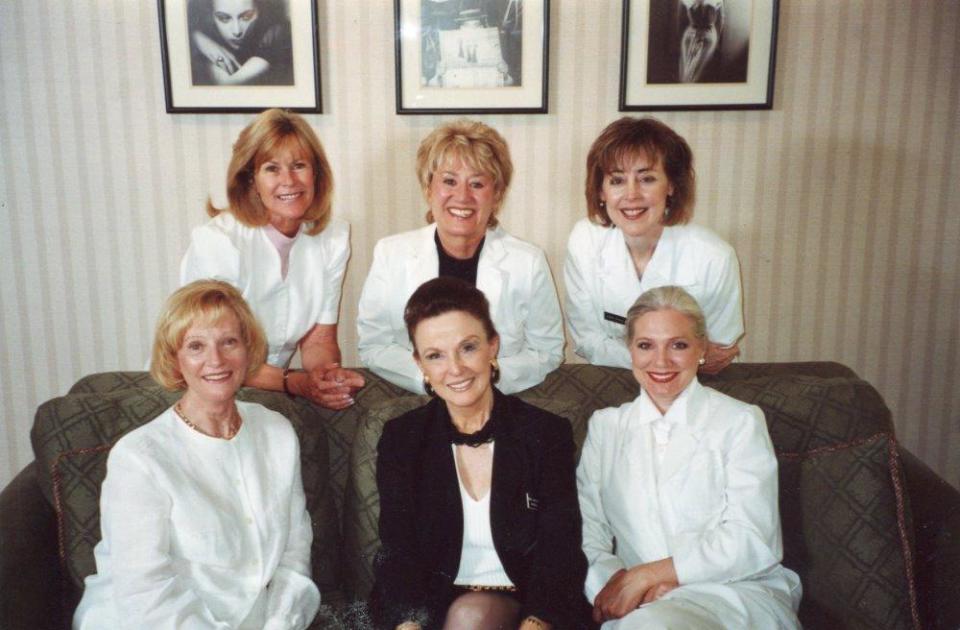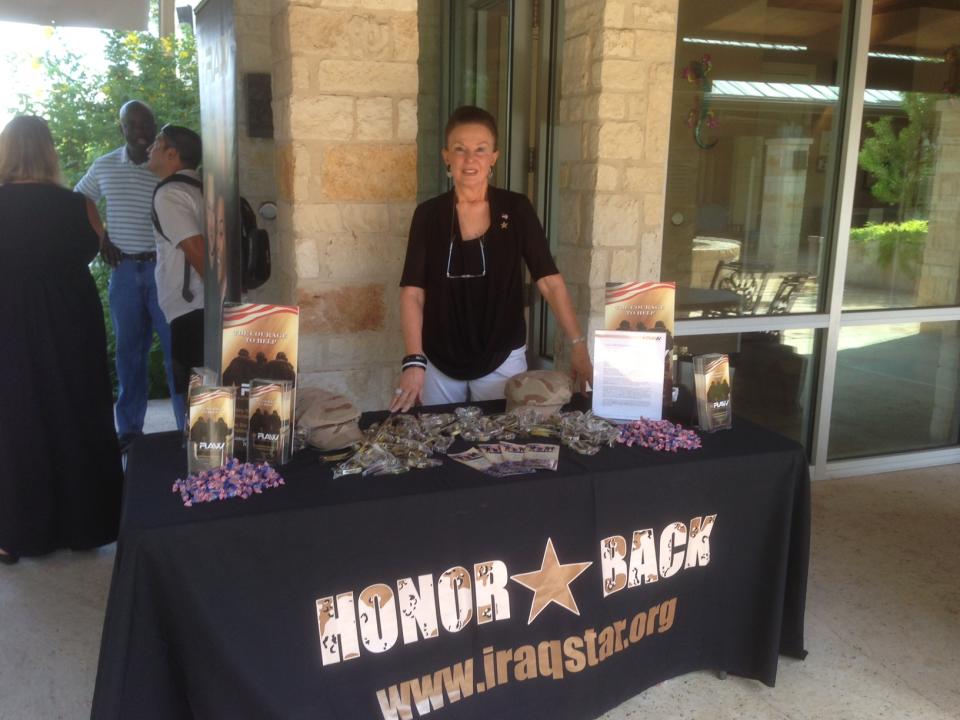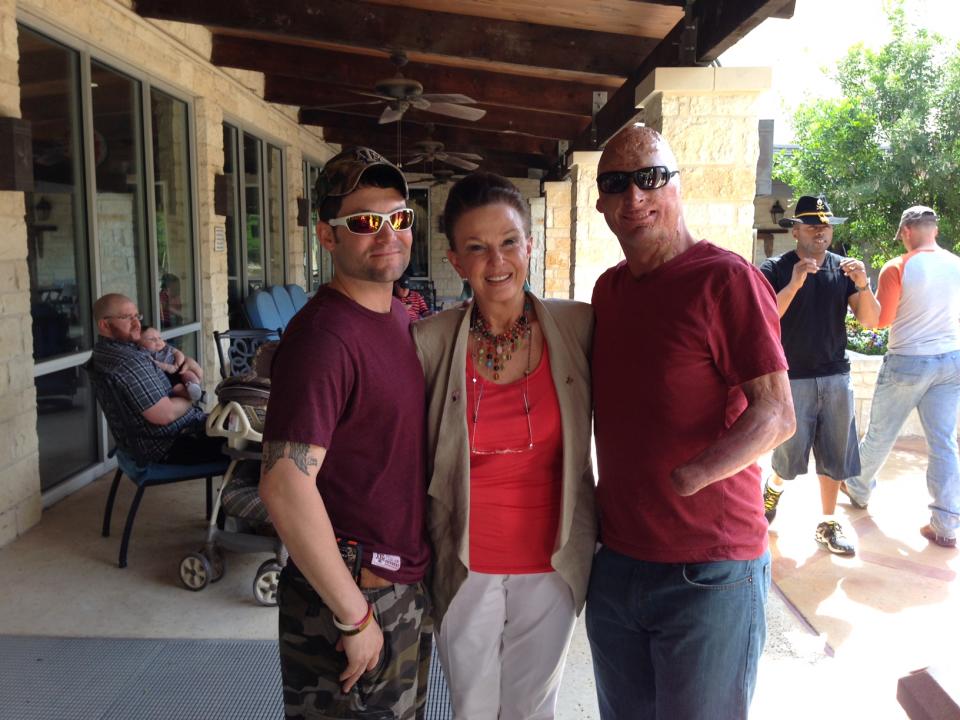How one former U.S. Air Force nurse is 'Rebuilding America's Warriors'
About a year after Maggie Lockridge’s non-profit helped to reconstruct an Army private’s eye that was injured during an ambush in Iraq, Lockridge got a special message from the young man’s mother.
“This woman had so many tears in her eyes,” Lockridge, a veteran herself, recalled. “And she looked at me and she said: ‘I don't worry about my son committing suicide anymore.’”
Since 2007, Lockridge’s foundation — R.A.W., or Rebuilding America’s Warriors — pairs renowned plastic surgeons with military members disfigured in Iraq or Afghanistan to repair the damage in the most aesthetically pleasing way.

“Men are vain, too, and these are young boys mostly, a few young women,” she said. “They care about their appearance and I just wanted them to feel as good as possible... to help them get back into society as quickly as possible.”
‘I was out that day’
Lockridge’s own service and her journey to rebuilding soldiers may never have happened if she hadn’t suffered a broken heart decades ago in New York.
After graduating from nurse’s training in Boston, she moved to the Big Apple where she fell madly in love with a young General Motors junior executive. Three days after he asked her to marry him, they broke it off.
“I thought: ‘If I'm not going to have the love of my life, I'm going to have a career,’ so I chose the Air Force,” Lockridge recalled.

Even though Lockridge wanted to go to Vietnam, she had to spend a year stateside, stationed in Grand Forks, North Dakota, with 136 women and 6,000 men, “which wasn't bad,” she said with a laugh.
While there, she fell for an Air Force fighter pilot. They married and soon after she became pregnant — a major no-no in the Air Force. She hid it for seven and a half months before her commanding officer asked her to come in.
“‘Lieutenant Lockridge, do you have something to tell me?’” she recalled her superior saying. “I was out that day and I was so upset about that, and my [Air Force] career was done at that point.”
‘I’ll open my own, so I did’
Lockridge and her family eventually moved to Hawaii where her then-husband flew F-102s for the Hawaii Air National Guard. They lived there for 11 years until Lockridge and her husband split up. She then moved to Los Angeles.
Leveraging her nursing background, Lockridge was hired as a charge nurse to tend to patients recovering from plastic surgery. Even though her employer went bankrupt about two years later, a spark had been lit.
“I thought, ‘I’ll open my own,’” she said. “So I did.”
Her company, Shanteque, was in business for 18 years and catered to the stars, the rich, and the powerful, many of which traveled from all over the globe to have facelifts, liposuction, breast implants, and more from world-renowned plastic surgeons.

“We had TV journalists. We had the movie stars. We had ambassadors,” she said. “I never knew who I was going to find in the room when I came in.”
Her nurses operated out of luxury, five-star hotels where her company secured a private wing or an entire floor. The company had three town cars that would whisk patients to the surgery facility for their appointments and pick them up afterward. The nurses would help the patients during recovery that could last one to 10 days.
At the height of her businesses, Lockridge employed 38 nurses and operated out of 22 hotel rooms. In 2005, two women told Lockridge they wanted to buy her business.
“I threw out a number and they said: ‘Fine,’” she said. “And I was out of a job in a month.”
‘Let me take care of the aesthetic’
Lockridge moved to her second house in Rancho Mirage in southern California permanently after that. She wrote a book, “Facelift Hotel,” recounting her experiences and advising people on plastic surgery recovery.
In 2007, she watched a special on VA hospitals by the TV journalist Bob Woodruff, who suffered a traumatic brain injury while field-reporting from Iraq. She was struck by how overwhelmed the hospitals were, especially Walter Reed, to meet the basic needs of the wounded soldiers returning from war.
“If they're not able or equipped to handle all the structural and functional wounds, they're certainly not doing the aesthetic,” Lockridge said. “Let me take care of the aesthetic because it's the aesthetic that can be so depressing and hold someone back so much from stepping back into society.”

That was the beginning of Iraq Star, a play on the word “rockstar,” which later did business as Rebuilding America’s Warriors to better show what her mission was. She tapped her rolodex of Beverly Hills doctors to see if they would volunteer their services.
“I wrote 30 letters to my 30 favorite surgeons in Los Angeles, and they all came on board,” she said.
She soon realized that R.A.W. needed a wider network of surgeons who weren’t based in just Los Angeles. R.A.W.’s medical director sent emails to members of different plastic surgery associations. The organization’s surgeon network quickly grew from 30 to 150 to 420 board-certified reconstructive surgeons in all 50 states.
‘Never see a bill’ from a surgeon
R.A.W. advertises in Marine and Army base newspapers and distributes brochures at Fisher Houses, comfort homes where military families stay for free while a loved one receives treatment. Lockridge conducts phone interviews with each interested veteran.
“Hopefully, within 20 to 30 days they’re at one of our doctors and having their corrective surgery,” she said. “I never see a bill from one of our surgeons.”

The surgeons volunteer their services and if they have their own surgery center, they donate that, too, Lockridge said.
R.A.W. picks up the tab for travel and lodging expenses for the veteran and often a loved one, food, anesthesia, medical supplies, medications, and after-care if the veteran needs it. The costs can range from $900 to as much as $16,000. The foundation helps between 30 to 60 veterans a year.
‘Don’t forget them’
Lockridge depends on donations to keep R.A.W. in operation. It’s gotten tougher in recent years as Iraq and Afghanistan have faded from the media limelight, but soldiers are still suffering from catastrophic injuries overseas.
“A young man had his entire buttocks blown off and he had to carry a donut ring with him wherever he went,” Lockridge said. R.A.W. stepped in and, after two, six-hour surgeries, new buttocks were reconstructed from fat from other parts of his body.

“I mean we take our butt for granted,” Lockridge said. “It’s very important to be able to have something to sit on and so it changed his life, just a little thing like that.”
She hopes her message renews interest in not just R.A.W., but the suffering of wounded veterans.
“We're still getting soldiers from Afghanistan. It's terrible... and it's not made an issue anymore, and I wish it was,” she said. “This will help to let the people know that our veterans are still in need and don't forget them.”
Janna is an editor for Yahoo Finance and Cashay. Follow her on Twitter @JannaHerron.
Read more:
'Drop by drop': How a trio of former Army engineer officers created an Afghan spice business
'Nobody blinked an eye': How the Navy taught this sailor financial discipline
Read the latest financial and business news from Yahoo Finance
Follow Yahoo Finance on Twitter, Facebook, Instagram, Flipboard, SmartNews, LinkedIn, YouTube, and reddit.

 Yahoo News
Yahoo News 

